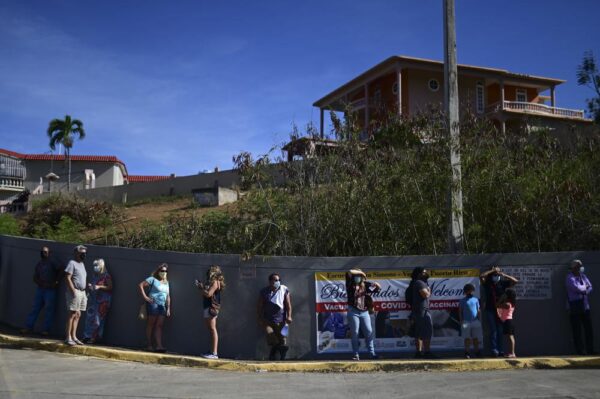ACLU Challenges Puerto Rico COVID-19 ‘Fake News’ Laws
SAN JUAN, Puerto Rico — The American Civil Liberties Union and the ACLU of Puerto Rico today filed a First Amendment challenge against Puerto Rico’s two recent “fake news” laws. The laws, one of which was passed in the midst of media coverage critical of Puerto Rico’s handling of the COVID-19 pandemic, make it a crime to share information the government deems false about emergencies in Puerto Rico, including the current COVID-19 global pandemic. Violators could face up to three years in jail and a fine of up to $5,000.
The lawsuit was filed on behalf of two journalists, Sandra Rodríguez Cotto and Rafelli González Cotto, who fear that the laws will be used to punish them for their reporting on the COVID-19 crisis, especially reporting that reflects negatively on the government. They argue the laws violate their constitutional rights to free speech, free press, and due process, and are seeking a court order blocking their enforcement.
“It is during times of crisis, like the pandemic that we now face, that the people need to receive more information on how its government is operating,” said plaintiff Sandra Rodríguez Cotto. “The press must be free to do its job, without fear of government reprisal. These laws place a significant barrier on the flow of information of public interest, and the debate that must be allowed.”
The ACLU argues that Puerto Rico’s “fake news” laws, which do not require the government to demonstrate that the speaker knew the speech was false, violate the First and Fourteenth Amendments because of their vague terminology and broad sweep. The laws give people far too little guidance on what speech may constitute a crime and government far too much discretion in deciding whom to prosecute. As a result, the laws chill a great deal of reporting on the COVID-19 crisis and other emergencies, because journalists risk prosecution if the government disputes the accuracy of their reporting.
“A free and democratic society depends on a free press, especially during times of emergency,” said Brian Hauss, staff attorney with the ACLU’s Speech, Privacy, and Technology Project. “These ‘fake news’ laws violate the cardinal principle of the First Amendment, which is that the government cannot be trusted to regulate discussion on matters of public concern.”
Although the laws ostensibly apply only to “false information,” the ACLU warns that they will inevitably suppress a great deal of true information about matters of immense public concern. The ACLU adds that government transparency, not censorship, would be a more effective way to combat disinformation, if that is indeed the government’s aim. The government could start by holding regular press briefings about the COVID-19 crisis in Puerto Rico, releasing pertinent records, and explaining its planned course of action to the public.
“For far too long the people of Puerto Rico have had to tolerate administrations that legislate in the dark of the night, rendering no accountability to the people, nor answering to any form of oversight,” said William Ramirez, executive director of the ACLU of Puerto Rico. “These laws only serve to promote fear in those that demand answers and clean government. They must be struck down as offensive to the First Amendment and democratic government.”
Sandra Rodríguez Cotto is the host of the syndicated radio program “En Blanco y Negro con Sandra” and published the first 11 pages of a Telegram chat between then-Gov. Ricardo Rosselló and his aides, revealing the use of misogynistic language and descriptions of violence against women. Media coverage of the then-governor’s chats led to island-wide protests against the government, with the governor ultimately stepping down. Her reporting has also exposed the government’s severe undercount of the numbers of deaths resulting from Hurricane Maria and its failure to distribute relief aid to earthquake victims.
Rafelli González Cotto has published numerous pieces on Puerto Rico's response to the COVID-19 outbreak. His reporting revealed, for instance, that the case fatality rate published by the health department significantly undercounted the actual fatality rate. Soon after the article was published, the health department removed the information from its website. As a result of the laws, he fears he will be unfairly prosecuted for accurate reporting the government disputes as false, and has already had sources stop sharing information as usual under the fear that the government might use the laws to prosecute them.
The lawsuit was filed in federal court for the district of Puerto Rico.
***
Since the start of the COVID-19 pandemic, the ACLU and its 54 state chapters have filed over 110 legal actions nationwide to save lives, safeguard the right to vote, protect abortion rights, and guard against unjustified government overreach. Additional information on those actions is here: https://www.aclu.org/news/civil-liberties/how-the-aclu-is-responding-to-the-pandemic-visualized/.
The complaint is here: https://www.aclu.org/legal-document/rodriguez-cotto-v-vazquez-garced-complaint.
A blog post on the filing is here: https://www.aclu.org/news/free-speech/were-suing-to-protect-press-freedom-during-the-covid-19-pandemic.
A Spanish version of this release is here: https://www.aclu.org/press-releases/aclu-reta-las-leyes-de-puerto-rico-contra-fake-news-de-covid-19.
